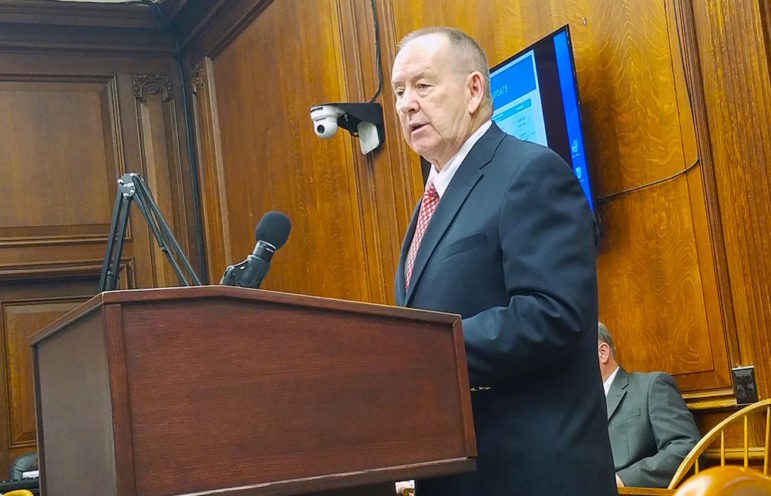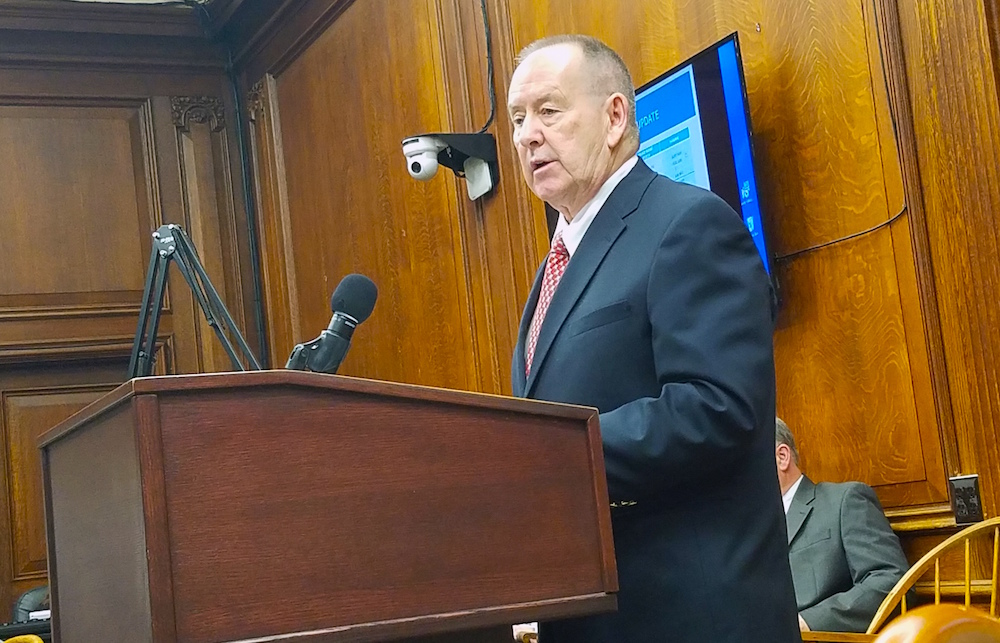
The new growth in Watertown, due largely to the development in town, along with an increase in permit fees being paid to the town are two main factors for the Town starting with a surplus as planning begins for the Fiscal 2021 budget.
Tuesday night, Town Manager Michael Driscoll presented the Preliminary Fiscal 2021 Budget Overview to the Town Council. The forecasted expenditures for FY21, which begins July 1, 2020, is $155.77 million. The projected revenues are $156.33 million, leaving a surplus of $556,829, Driscoll said. Last year, in comparison, the preliminary budget had a deficit of $820,000.
The budget includes a 2.5 percent increase for all municipal departments, including police and fire, and a 5 percent increase for the Watertown Public Schools, Driscoll said.
Increasing Revenues
A major contributor to the revenue increase, Driscoll said, is new growth. This is the increase in property taxes collected above the amount brought in by the rate increase, and typically comes from new developments or property improvements.
In Fiscal 2019, which ended June 30, 2019, the Town collected $108.6 million real estate and personal property taxes. That amount was nearly $100,000 more than projected. In the current fiscal year, FY20, local property taxes are expected to bring in $116 million.
When the Fiscal 2021 Budget was forecasted in April, Town officials projected local property taxes to be at $121.4 million, but Tuesday night, Driscoll said, that figure has been increased to $122.6 million — an increase of $1.24 million.
Fees collected by the Town, largely from developers, are projected to increase to $4.2 million, up $102,500 from the FY20 budget. That source of funding is expected to start to drop in FY22, when it is forecast to be $1 million lower.
The new hotel opening at Arsenal Yards is expected to increase the amount of local hotel tax dollars by $150,000 to $950,000.
As in past years, the budget pencils in the same amount of Local Aid as the previous year, which was $13.2 million.
Retirement Deficit & School Projects
While the budget news Driscoll presented to the Town Council was largely positive, he added that the retirement of the unpaid pension deficit was premature.
In June, when the Council approved the FY20 budget, Driscoll announced that the Town had paid off its unpaid pension obligation with the passage of the FY20 budget. The shortfall is faced by all communities in Massachusetts, but Watertown chose to pay it down more aggressively than most.
The Town had been paying down the deficit by more than $10 million a year, including $13.8 million in FY20. The money freed up by the obligation being met would be largely used to pay for the Building for the Future, the Watertown Public School’s $170 million reconstruction of its three elementary schools.
Tuesday, Driscoll said that there had been changes in the way that the retirement benefits are funded.
“People are living longer than previous mortality tables predicted, which is a good thing, but new mortality tables had to be adopted (by the Watertown Retirement Board),” Driscoll said. “Also, current economic conditions are not favorable for continuation of the current rates of return on investments.”
This resulted in an increase of $12.56 million in the unpaid pension liability, which will take one more year to pay off. In FY21, the Town will have to pay $14.63 million toward the pension liability.
The money will not be taken out of the Building for the Future, Driscoll said, but rather from the paying off of another post-retirement deficit — called the other post employment benefits (OPEB) fund. Driscoll added that the pay off schedule for OPEB will still be on schedule to end in FY29, as previously planned.
The Building for the Future also includes the rebuilding or renovation of Watertown High School. While the Town is paying for the elementary school projects, Watertown is working with the Massachusetts School Building Authority (MSBA) on the WHS project.
Driscoll said that this will make the Town eligible for state reimbursement for almost half the cost of the project, however, it will require voters to approve a debt exclusion to increase taxes for a period to pay for the Town’s portion of the costs. The vote is expected to take place in calendar year 2021.
“I certainly feel this is a desperate need, and the School Committee needs to educate the community on why it is necessary,” Driscoll said.
Other Funds
In his budget, Driscoll also covered other funds, including the Community Preservation Act funds and the Water and Sewer Enterprise Funds.
The Town has been collecting Community Preservation money from a property tax surcharge for the past two years. As of June 30, 2019, the town has collected $4.36 million, with 10 percent (or $386,739) required to be spent on each of three areas: open space/recreation, historic preservation, and community housing. He estimates that the amount in the fund on June 30, 2020 will be about $6.8 million.
Both the Sewer and Water enterprise funds had revenue shortfalls in the most recently completed Fiscal Year, FY19, Driscoll said. The revenues were $606,480 below the expenditures in the FY19 sewer fund, and $277,482 in the FY19 water fund. The revenues are based on the use of water and sewer in town, so a significant drop in use will result in lower than projected revenues. The Department of Public Works will work with the Town’s water and sewer consultant to study the issue.
“We will do a review of the rate structure, and look particularly at consumption,” Driscoll said. “If it is one year it can be absorbed, but if it is multiple years, we need to make adjustments.”
Unspent funds from prior years can be used to cover the shortfall in the current fiscal year, FY20. At the end of FY19, the Water fund had a carryover of $812,620, and $3.37 million in the sewer fund.
Budget Process
The next step in the budget process is for the Town Council to adopt its budget priorities. Councilors will send their budget priority list to Council Vice President Vincent Piccirilli, who chairs the Council’s Budget and Fiscal Oversight subcommittee, by Oct. 25.
The subcommittee will hold three meetings to discuss the budget priorities on Oct. 29, Nov. 4 and Nov. 18. The meetings are open to the public. The Council will present its budget priorities at the Nov. 26 Town Council meeting.

Maybe now we can get some drivable roads and usable sidewalks? Or maybe senseable changes to actually resolve some of our traffic issues? (sigh… probably not). Our officials need to go. We can do better. #WatertownNeedsAMayor.
I agree with the above comments. I’d like to add that same old question, if this is true why oh why have our taxes done nothing but go up? Between the undrivable roads and the high taxes in this town which continually rise, you are creating an UNDESIRABLE town for your own residents. Not the same wonderful town I grew up in, just another money grabbing town government. So disappointing.